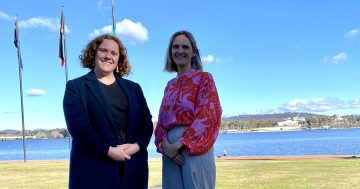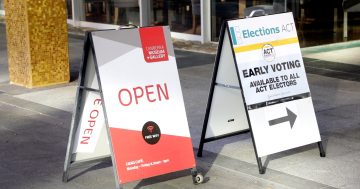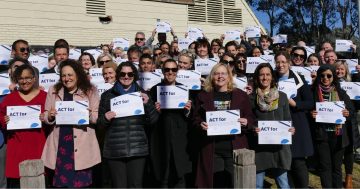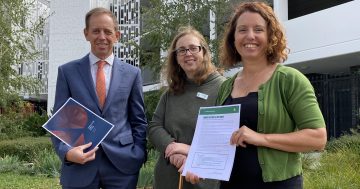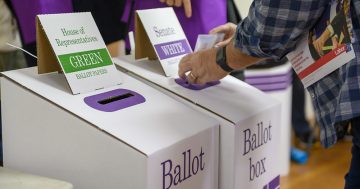This is a story about politicians, truth and trust. It comes from Canberra, where I live, but contains some thoughts I think that may apply across Australia. It first appeared in enpassant.com.au
Politicians deal with ambiguity. Often that ambiguity flows from the class differences they temporarily resolve or smooth over. Sometimes they avoid stating the truth. This is an act of omission, not commission, so it is not lying. It is just not being honest with the electorate.
This is especially true if election or re-election depends on not stating a truth.
In the run-up to elections here in Canberra in mid October not one mainstream politician made any reference to the likely or possible impacts of the global economic crisis on the next A.C.T Government. Not one. They all operated on the figures the local Treasury supplied in September yet a Freddy like me could see these were far removed from the developing reality.

Before the election this is what I wrote for Online Opinion in an article entitled Don’t mention the economy – there’s an election on.
But something is missing from all the chatter, white noise and waving political gnomes standing on the side of major roads as you drive to work.
Not one Canberra politician has actually mentioned the global economic crisis.
Even at a superficial level you’d think some of them, if they were truthful and honest, might be considering adding a caveat to their promises. You know, something like: “Paid maternity leave in the ACT Public Service will be extended to 18 weeks and there will be paternity leave of two weeks. This of course is subject to the Territory’s financial situation being robust enough to enable us to afford such a cost despite the global economic crisis.”
Funny, but I haven’t heard one politician mutter this truth contained in that last sentence. (The ALP has in fact offered an 18-week paid maternity leave scheme for its employees. But no mention of whether there is the ability to fund it.)
This conspiracy of silence about the impact of the economic crisis on the ACT makes me think our politicians know that we are in for tough times ahead but that such honesty might impact on their capacity to get elected. So they pretend the crisis doesn’t exist.
New A.C.T Treasury figures released recently show the turn around from the September figures is half a billion dollars. So instead of rosy budget surpluses totalling $227 million over the next four years there will be deficits of around $100 million each year. The same process will be going on across Australia.
What does this mean for the Budget in the A.C.T. and future spending, including election promises?
The Chief Minister Jon Stanhope says there might need to be some re-prioritising of election commitments. The cynic in me says “nudge, nudge, wink, wink.” Stanhope also says that we Canberrans know there won’t be an array of new spending initiatives.
This was clear before the election. Why the silence then? Why not be honest with taxpayers and say that things might get worse? One reason is because it might have meant not getting elected, or so the politicians thought. For them their own individual position is more important than speaking plainly with the community.
But I think there is a deeper reason. Because of the different interests in society politicians often frame their discussion in such a way to appear to address all these interests. Indeed they flatten out the differences so we hear talk of “in the national interest, in the interest of all Canberrans” on so on. There is no such thing as the national interest; rather there are the needs of the employing class which become transposed as the national interest. This is trickle down propaganda. What’s good for the boss is good for the worker.
Yet the relationship between boss and worker is essentially antagonistic, not cooperative. The national interest phrase hides the reality of class division in society. What is in the interests of BHP bosses is not necessarily in the interests of its workers.
This balancing between competing needs doesn’t mean politicians won’t make decisions – they do. Here in Canberra for example the Government controversially approved a data centre and power station 600 metres from suburbs. Again it was painted as being of benefit for all Canberrans, although the people who lived nearby, and downwind like me, had different ideas.
But the strategy of not talking about impending economic changes (or other changes for that matter) has a strong temptation for politicians. It helps them avoid later blame and/or responsibility.
Yet we voters are not fools. We can digest information and make rational decisions based on that information, especially before an election.
And I think this is an important point. Some politicians don’t trust voters. They fear them and so don’t take them into their confidence. They just ignore the changing circumstances in the hope that no-one in the community notices, at least until after the election. Then they can claim they acted on or made promises on the best possible advice at the time but circumstances have now changed.
Our Chief Minister has vowed the Budget won’t be as hard as 2006/07. The ALP won’t be closing any more schools. That’s because they did that dirty work in 2006. But I wonder what the targets in this coming Budget will be? Capital works, health, community services? And Government workers are always a good whipping horse. Apart from public service job and wage cuts (with the mantra of more with less) I suspect that the A.C.T public service 18 week maternity leave scheme is gone, or rather will be “re-prioritised”.
The Government has already closed one public library, although electoral pressure will see some sort of compromise arrangement in place. But given the cost of public libraries I would guess that more will be closed and replaced with some cheaper perhaps mobile alternative.
Hospitals take up a large amount of the Budget expenditure. Less beds, less nurses, less expensive technology might be one response of a Labor Government looking to save money. Times for elective surgery may well lengthen, although it is possible proposed extra health funding from the Commonwealth will see few attacks on hospital expenditure in this forthcoming A.C.T. Budget.
The Government’s revenue is collapsing because GST (as everywhere else) is falling and property returns are collapsing because of declining prices and fewer sales. (These are two major sources of income for Canberra since it has little major industry).
The Government will increase other taxes or search for new revenue options. The question will then be who bears the burden – the rich or the rest of Canberra? I suspect that with the Greens holding the balance of power the ALP Government will design some “green” taxes which will cut the living standards of ordinary Canberrans. Parking will be come more expensive (perhaps with a congestion tax) at the same time as public transport infrastructure fails to match the increasing demand.
The Greens reached agreement with the ALP about certain commitments the Labor Government would undertake for Green support for a minority ALP Government. Their program will be under threat. Indeed the Chief Minister has already said he would discuss with the Greens whether the ALP’s own priorities were higher than theirs. If this came about, what would it mean?
The Greens proposed renewable energy plant might be delayed, along with the free water efficiency programme planned for about a quarter of Canberra houses. Energy efficiency retrofitting of homes might roll out over a longer period. Presumably the plastic bag trial will go ahead since it is more or less cost free. Bigger ticket items like increased public transport will not eventuate as quickly.
The agreed Greens’ goal of ten percent of dwellings in the A.C.T. being public seems to be something that will now not be tried (assuming that we are some way from that figure at the moment.)
There is a political problem for the Greens here too. Where can they go if the ALP toughens it out and doesn’t adopt their programme as quickly as the Greens wanted?
Certainly not to the Liberals because they will use the same argument. They too will say the economic climate doesn’t allow for these Green programmes just yet.
The logic of capitalism has captured the Greens. Their slogan – neither left nor right but out front for Canberra – now looks pathetic. How can you be out front for Canberra if the capitalist mode of production is in crisis and that adversely affects the capacity to deliver your promises? Your are either left or right (and within the left, pro-capitalist or pro-socialist).
All of this was predictable. What a pity our politicians couldn’t take us into their confidence before the election. Trust and truth are hard enough to get from them in good economic times. In bad economic times truth and trust become like Wall Street without the bailout.













